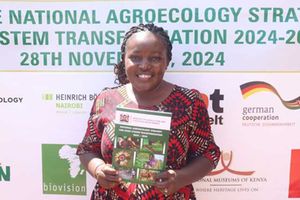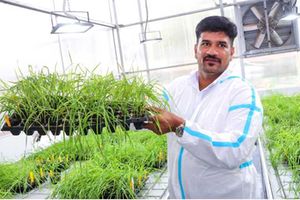
Agricultural Finance Corporation Managing Director George Kubai.
The Agricultural Finance Corporation (AFC) is a state institution charged with supporting farmers. Indiazi Agade talks to George Kubai, the AFC Managing Director, on the organisation’s contribution to farming transformation.
How has AFC aligned its goals and strategies with the Malabo Declaration’s commitments to transforming agriculture?
The mandate of AFC is to support agricultural development by providing sustainable credit to smallholders and commercial farmers. This aligns with the Malabo Declaration’s goal of increased agricultural funding. Due to the uncertainties of agriculture, many financial institutions avoid lending to the sector, resulting in exclusion, particularly for youth, women and rural populations. Our Strategic Plan addresses this by prioritising financial inclusion for these groups.
What has AFC done to back the Malabo Declaration goals?
The corporation has developed products using alternative collateral to enhance access to credit and improve repayment rates for smallholder farmers. This includes the Warehouse Receipt Finance, Asset Financing and wholesale lending through Savings and Credit Cooperative Societies (Saccos), Micro-finance Institutions (MFIs) and anchor models. In partnership with strategic allies, we have conducted training to educate existing and potential clients on financial literacy, farming as a business and related topics. AFC has secured funding from the International Fund for Agricultural Development, the World Bank, the African Development Bank (AfDB), GIZ and other institutions. We have also implemented projects with private institutions to support funding in the agriculture.
How has AFC addressed the Malabo Declaration’s emphasis on inclusivity?
The corporation has programmes that promote inclusivity through partnerships. In collaboration with the government and the AfDB, we initiated the Enable Youth Programme (EYP), which targets graduates interested in agribusiness, providing them with employment.
The corporation has incorporated a key performance indicator of 30 per cent participation for persons with disabilities into our performance contracts.
What products or services does AFC have for smallholder farmers?
In collaboration with partners and the government, AFC introduced the Warehouse Receipt Financing. This enables smallholder farmers to access credit by using receipts obtained upon depositing their produce in licensed warehouses for safekeeping as collateral. AFC has also developed a wholesale lending product to expand outreach by providing loans to participating financial institutions, which then lend to smallholder farmers. These participating institutions, such as saccos and micro-finance banks, possess a broader collateral base and offer smaller loans. We utilise an anchor client model, providing support to aggregators and off-takers who assist smallholder farmers with financing, inputs and market access.
How does AFC leverage technology to improve access to finance?
AFC has integrated innovations and digital solutions to enhance finance accessibility, streamline processes and promote sustainable agricultural growth in line with the Malabo Declaration. This includes automation of the loan origination and appraisal system. AFC has digitised loan processing, enabling faster approvals, seamless credit assessments and real-time integration with banking systems.
We also have custom credit scoring models. Our custom risk assessment incorporates agro-ecological conditions, farm capacity and alternative financial data, ensuring more inclusive funding for smallholders. Then there are the alternative financial delivery channels, where farmers access loans through USSD, mobile apps and with automated repayments, reducing reliance on physical branch visits. AFC works with FinTechs to enhance risk analytics and introduce tech-based solutions to increase impact and outreach.
What strategies has AFC adopted to safeguard investments and support farmers’ resilience against climate change and market fluctuations?
The strategies include diversification of financial products, climate-smart agricultural loans and market linkages and value chain development.
How is AFC aligning with the Kampala Declaration?
AFC is aligned with the Kampala Declaration through its Strategic Plan 2023-27. The plan was developed with consideration of Agenda 2063. The first Strategic Objective is to “Drive Sustainable Agri-food Systems”.
The implementation of this objective is on.
Malabo reaffirmed Africa’s commitment to agriculture-led growth for food security and prosperity. Kampala Declaration sought to strengthen these aspirations, especially in light of emerging threats like global warming. How can AFC help ensure the full implementation of these commitments?
AFC is uniquely positioned to respond to the persistent gaps and advance Kenya’s alignment with the Malabo and Kampala Declarations.
To facilitate access to credit, particularly for smallholders and medium-scale farmers, AFC is implementing key transformative interventions, including enhancing efficiency and impact of agricultural financing, catalysing private sector participation and implementing inclusive and targeted finance windows.
The corporation is shifting towards results-based financing, where every investment is tied to clear development goals in food security, climate resilience and competitiveness.
In line with the Kampala Declaration’s call for enabling policy environments, AFC is working with the government and development partners to de-risk investments.
Through blended finance structures and risk-sharing facilities, such as Enable Youth Kenya, AFC is crowding in local private capital, predominantly in high-impact areas like agro-processing, mechanisation and irrigation.
To support inclusive growth, AFC has launched specialised lending windows tailored for women, youth, agri-SMEs and smallholders. In pursuit of transparency and accountability and inclusion, AFC is adopting digital platforms, early warning systems, geospatial analytics and data-driven decision-making tools to improve credit targeting, risk profiling and loan performance.
The Financing Agri-food Systems Sustainably Summit has been hailed as a key platform in rallying Africa and the private sector towards the achievement of the Kampala Declaration. What is AFC’s role in FINAS 2025?
The summit focuses on rethinking sustainable financing for Africa’s food systems, addressing challenges like limited access to finance for smallholder farmers and agri-SMEs. AFC naturally has a central place in it. Our alignment with the summit is evident in our commitment to providing innovative and inclusive financing solutions for agriculture.
The participation of AFC underscores its dedication to fostering partnerships, leveraging technology and de-risking investments in agriculture to enhance productivity and sustainability.
The summit will also explore areas like climate adaptation, digital transformation and policy frameworks, which align closely with AFC’s mission to support agricultural value chains and improve food security.
It’s a great opportunity for us and like-minded partners to showcase solutions and collaborate with other stakeholders to shape the future of sustainable agri-food financing.
AFC is a key partner and will be featuring heavily on the summit’s programme as speakers among others.





